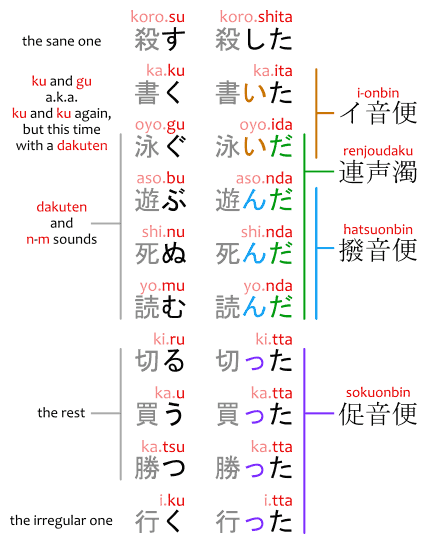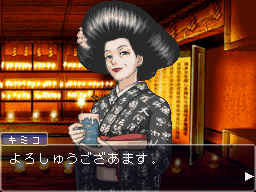In general, onbin seems to affect only the ren'youkei 連用形 form of verbs and adjectives. So you have the normal ren'youkei form, and the distorted onbinkei form.
五段
The ren'youkei of godan verbs is affected by onbin when they come before the jodoushi 助動詞 ~ta ~た, ~te ~て, ~tara ~たら, and ~tari ~たり. Also called past form, te-form, tara-form, and tari-form.Depending on the ending of the godan verb, a different kind of onbin affects it.
The godan verbs ending in ~su ~す aren't affected by onbin.
- korosu, koroshi-ta
殺す, 殺した
Kill. Killed.
The godan verbs ending in ~ku ~く and ~gu ~ぐ are affected by i-onbin イ音便, which turns ~ki ~き or ~gi ~ぎ into ~i ~い..
- kaku, kaki-ta, kaita
書く, 書きたい, 書いた
To write. Wrote. - oyogu, oyogi-ta, oyoida
泳ぐ, 泳ぎた, 泳いだ
To swim. Swam.
The godan verbs ending in ~bu ~ぶ, ~nu ~ぬ, and ~mu ~む are affected by hatsuonbin 撥音便, which turns ~bi ~び, ~ni ~に, or ~mi ~み into ~n ~ん, which is called a hatsuon 撥音.
- asobu, asobi-ta, asonda
遊ぶ, 遊びた, 遊んだ
To play. Played. - shinu, shini-ta, shinda
死ぬ, 死にた, 死んだ
To die. Died. - yomu, yomi-ta, yonda
読む, 読みた, 読んだ
To read. Read (in the past.)
Note that the endings with diacritics, ~gu ~ぐ and ~bu ~ぶ, and the n-m sounds, ~nu ~ぬ and ~mu ~む, are also affected by renjoudaku 連声濁, which turns the ~ta ~た jodoushi into ~da ~だ, with a dakuten 濁点 (゛).
The godan verbs ending in ~ru ~る, ~u ~う, and ~tsu ~つ, are affected by sokuonbin 促音便, which turns ~ri ~り, ~i ~い, and ~chi ~ち into a small tsu っ, which represents a double consonant, or "geminate consonant," a sokuon 促音.
- kiru, kiri-ta, kitta
切る, 切りた, 切った
To cut. Cut. (in the past.) - kau, kai-ta, katta
買う, 買いた, 買った
To buy. Bought. - katsu, kachi-ta, katta
勝つ, 勝ちた, 勝った
To win. Won.
Lastly, the verb iku 行く is irregular, despite ending in ~ku ~く, it doesn't suffer i-onbin, it suffers sokuonbin.
- iku, iki-ta, itta
行く, 行きた, 行った
To go. Went.
Source: japanesewithanime.com (CC BY-SA 4.0)
In the strict sense, onbinkei refers only to the part affected by the onbin. For example, in shinda 死んだ, the onbinkei is shin 死ん, because that's the ren'youkei shini 死に affected by hatsuonbin.
The ~da part is the ~ta jodoushi suffix affected by renjoudaku and isn't part of the ren'youkei, so, strictly, it isn't part of the onbinkei either.
In godan verbs, if a verb has an onbinkei with ~ta ~た, it uses that same onbinkei with ~te ~て, ~tara ~たら, and ~tari ~たり. The renjoudaku also affects all of these jodoushi, so if a verb ends in ~da ~だ, it will also end in ~de ~で, ~dara ~だら, and ~dari ~だり.
- koroshita, koroshite, koshitara, koshitari
殺した, 殺して, 殺したら, 殺したり - kaita, kaite, kaitara, kaitari
書いた, 書いて, 書いたら, 書いたり - oyoida, oyoide, oyoidara, oyoidari
泳いだ, 泳いで, 泳いだら, 泳いだり - asonda, asonde, asondara, asondari
遊んだ, 遊んで, 遊んだら, 遊んだり - kitta, kitte, kittara, kittari
切った, 切って, 切ったら, 切ったり
Note that the ren'youkei form isn't affected by onbin before the jodoushi ~tai ~たい. For example: asobitai 遊びたい, "want to play," does NOT become asondai あそんだい.
The ichidan verbs don't have onbinkei. That is, while the godan kiru 切る becomes kitta 切った, the ichidan kiru 着る becomes kita 着た, without sokuon. See ichidan vs godan for details.
Before ます
In general, the polite form, with the jodoushi masu after the ren'youkei, isn't affected by onbin.This means that shinimasu 死にます does NOT become shinmasu 死んます.
However, the verbs gozaru ござる, nasaru なさる, kudasaru くださる, ossharu おっしゃる, and irassharu いらっしゃる, undergo i-onbin when suffixed by ~masu.
- gozaimasu
ございます
To be. (polite.) - nasaimasu
なさいます
To do. (polite.) - kudasaimasu
くださいます
To give. (polite.) - osshaimasu
おっしゃいます
To say. (polite.) - irasshaimasu
いらっしゃいます
To go. (polite.)
To come. (polite.)
This is the origin of the expression irasshaimase いらっしゃいませ, used to welcome someone into a store, and the auxiliary verb kudasai ください, which translates to "please" in English.
Adjectives
The u-onbin ウ音便 affects the ren'youkei form of i-adjectives, which is the adverbial form, ~ku ~く, specially when they come before the verbs gozaimasu ございます and zonjimasu 存じます.- arigataku gozaimasu
ありがたくございます
(becomes...) - arigatou gozaimasu
ありがとうございます
[It] is thankful.
Thank you.
- tsuyoku gozaimasu
強くございます
(becomes...) - tsuyou gozaimasu
強うございます
[It] is strong.
- samuku gozaimasu
寒くございます
(becomes...) - samuu gozaimasu
寒うございます
[It] is cold.
- yoroshiku gozaimasu
よろしくございます
(becomes...) - yoroshuu gozaimasu
よろしゅうございます
[It] is good. [It] is fine.
Very well.
The same thing may happen with a number of variants, like gozaamasu ござあます.
Game: Gyakuten Saiban 2 逆転裁判2
- Kimiko
キミコ
(character name.) - yoroshuu gozaamasu.
よろしゅうござあます。
Very well.
四段
The u-onbin also affects the ren'youkei form of yodan verbs in a similar fashion to how i-onbin, hatsuonbin, and sokuonbin affect godan verbs. Note that yodan verbs are archaic and have been replaced by godan verbs in modern Japanese.- omofu, omohi-te, omoute
思ふ, 思ひて, 思うて
To feel and. (yodan, u-onbin.)
The modern variant would be:
- omou, omoi-te, omotte
思う, 思いた, 思って
To feel and. (godan, sokuonbin.)
Dialects
This u-onbin also affects godan verbs in modern Japanese in certain dialects, like Kansai 関西.- tanomu, tanomi-te, tanomoude
頼む, 頼みて, 頼うで
[I] entrust [you]. (godan, u-onbin, renjoudaku.)
[I] request [you].
Please do this for me.


No comments: